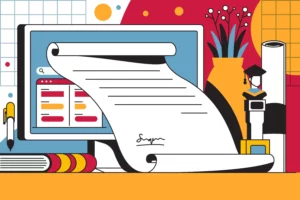What is an Adhesion Contract?
Contracts are important agreements people make to ensure everyone understands their rights and responsibilities. However, some types of contracts can be quite different from others. One such type is called an adhesion contract. Adhesion contracts are named after a special quality they possess: they stick! In an adhesion contract, one party has a lot of power, while the other party has very little room to negotiate or change the terms of the agreement.
How Do Adhesion Contracts Work?
Imagine you’re playing a game with your friends, and they make all the rules without giving you a chance to say what rules you’d like. That’s similar to how adhesion contracts work. Companies or organizations often use them to create standard agreements for their customers, like when you sign up for a new app or a membership at a store.
The Strengths & Limitations of Adhesion Contracts
Strengths:
Adhesion contracts can have some benefits. They help businesses set consistent terms and conditions for all their customers. This ensures that everyone is treated the same way and knows what to expect. For example, when you buy a toy from a store, the store might have an adhesion contract that says you can’t return the toy once you’ve opened the box. This helps the store maintain fairness and avoid confusion.
Limitations:
Although adhesion contracts have their advantages, they also have some limitations. Since one party has more power than the other, the terms of the contract may not always be fair. Sometimes, the terms can be too strict or one-sided, giving the stronger party more advantages and leaving the weaker party with less protection. For example, if you sign up for a video streaming service, the adhesion contract might say that the company can change the price or cancel your subscription at any time without giving you much notice.
Examples of Adhesion Contracts
Adhesion contracts are found in many areas of our lives. Some common examples include:
- Cellphone contracts: When you sign up for a cell phone plan, you usually have to agree to a contract that sets out the terms for how long you’ll be with the provider and what fees you might have to pay if you break the contract early.
- Software agreements: When you download a new app or software, you might have to accept an adhesion contract that outlines what you can and cannot do with the program.
- Insurance policies: Insurance companies often use adhesion contracts to define the coverage they offer and the conditions under which they will pay for damages or accidents.
Are Adhesion Contracts Fair?
Whether adhesion contracts are fair or not can be a matter of debate. Some people argue that they are necessary for businesses to operate efficiently and provide consistent services to their customers. Others believe that these contracts can be unfair because the weaker party has little to no bargaining power & may be forced to accept terms they don’t fully understand or agree with.
To make sure contracts are fair, some countries have laws that protect consumers from unfair terms in adhesion contracts. These laws require businesses to use clear language in their contracts, prohibiting them from including unfair terms.
What Can You Do if You Encounter an Adhesion Contract?
If you encounter an adhesion contract and are concerned about its fairness, you can do a few things. First, read the contract carefully to understand the terms and conditions. If there’s something you don’t understand, ask someone you trust, like a parent or guardian, to help you.
If you find unfair terms or believe the contract violates the law, you can try negotiating with the other party to change the terms. However, keep in mind that adhesion contracts often have little room for negotiation. In some cases, you may decide not to sign the contract if you feel it’s too unfair or find an alternative service or product that offers better terms.
In situations where you believe the contract is highly unfair or violates the law, you can seek legal advice. Lawyers can help you understand your rights and options, and they can guide you on how to proceed.
Remember, contracts are important agreements, and it’s essential to understand what you’re agreeing to before signing anything. If you have any doubts or concerns about an adhesion contract, take the time to seek advice and make an informed decision.
Adhesion contracts can sometimes put individuals or businesses in a challenging position, as they often contain terms that heavily favor one party over the other. However, there are tools and solutions available to help mitigate the potential risks and limitations posed by these contracts. One such solution is Volody AI Contract Lifecycle Management (CLM) software.
Negotiating Adhesion Contracts Using Volody AI CLM
Volody AI CLM software is a powerful tool designed to assist users in managing and analyzing their contracts efficiently. It utilizes advanced artificial intelligence technology to streamline contract management processes and provide valuable insights into the terms and conditions of adhesion contracts. Let’s explore how Volody AI CLM software can help mitigate the impact of adhesion contracts.
1. Understanding Complex Terms
Adhesion contracts can sometimes be complex and difficult to comprehend fully. Volody AI CLM software uses natural language processing (NLP) algorithms to analyze and break down contract language into more understandable terms. This feature allows users to grasp the key provisions, rights, and obligations outlined in the contract, ensuring that they have a clear understanding of what they are agreeing to.
2. Identifying Unfair Terms
One of the primary concerns with adhesion contracts is the potential presence of unfair terms that heavily favor one party. Volody AI CLM software employs machine learning algorithms to identify potentially unfair terms within the contract. It can flag terms that may be inconsistent with legal requirements & industry standards. By highlighting these terms, users can be alerted to potential issues and seek appropriate advice or negotiate for fairer conditions.
3. Streamlining Negotiation Processes
Although negotiation may be challenging with adhesion contracts, Volody AI CLM software can assist in streamlining the negotiation process. The software allows users to collaborate and communicate with other parties involved in the contract. It provides a secure and centralized platform for sharing feedback, proposing amendments, and tracking changes, enabling smoother negotiations and increased transparency.
4. Ensuring Compliance
Compliance with legal regulations and internal policies is crucial in contract management. Volody AI CLM software incorporates compliance management features that help ensure adherence to relevant laws and regulations. It can provide reminders for key dates and deadlines, alert users to potential compliance risks, and generate compliance reports. This functionality helps users mitigate legal and regulatory risks associated with adhesion contracts.
5. Enhancing Visibility and Reporting
Volody AI CLM software offers enhanced visibility into contract data and analytics. It generates comprehensive reports and visualizations that allow users to gain insights into contract performance, identify trends, and assess the overall impact of adhesion contracts on their organization. By leveraging these insights, users can make informed decisions, improve contract management strategies, and better navigate the complexities of adhesion contracts.
6. Automating Contract Renewals and Amendments
Adhesion contracts often have predefined terms for renewals and amendments, making it challenging to negotiate changes. The process of contract renewals and amendments can be automated by Volody AI CLM software, ensuring accurate tracking of key dates and conditions. By automating these processes, users can avoid unintentional contract renewals and efficiently manage amendments, thereby reducing the potential adverse effects of adhesion contracts.
Conclusion
In conclusion, adhesion contracts are binding agreements where one party has significant power, and the other party has limited ability to negotiate or modify the terms. These contracts can be found in various areas of our lives, such as cell phone plans, software agreements, and insurance policies. Adhesion contracts have both strengths and limitations. They help ensure consistency and clarity in agreements, but they can also be unfair, as the stronger party often benefits more from the terms.
To address the potential issues associated with adhesion contracts, there are legal protections in place in many countries. Consumer protection laws require businesses to use clear language, avoid excessively one-sided terms, and comply with regulations. It is essential for individuals to carefully read and understand adhesion contracts, seek advice if needed, and consider alternative options if they find the terms unfair.
In managing adhesion contracts, technology solutions like Volody AI Contract Lifecycle Management (CLM) software can be beneficial. This software helps users understand complex contract terms, identify potentially unfair provisions, streamline negotiation processes, ensure compliance, enhance visibility and reporting, and automate contract renewals and amendments. By leveraging such tools, individuals and businesses can better navigate the challenges posed by adhesion contracts and make more informed decisions.
Ultimately, while adhesion contracts can present challenges, being informed, vigilant, and utilizing available resources can help individuals and businesses navigate these agreements.
Related Blog: https://blog.volody.com/understanding-clickwrap-agreements/
About Volody Products Inc
Volody is a leading AI-enabled Contract LifeCycle Management (CLM) Software company helping businesses digitize and automate their legal contract management processes. Volody’s CLM uses AI & ML features to create smart and agile solutions. These solutions meet the needs of an ever-evolving business world. Trained with extensive data points, our smart CLM tool provides you with many insights. We help protect your company from any possible risks, be it financial, regulatory, or reputational.





